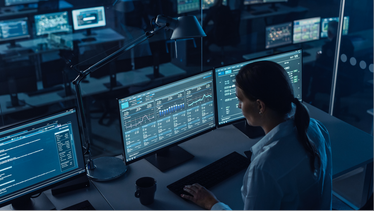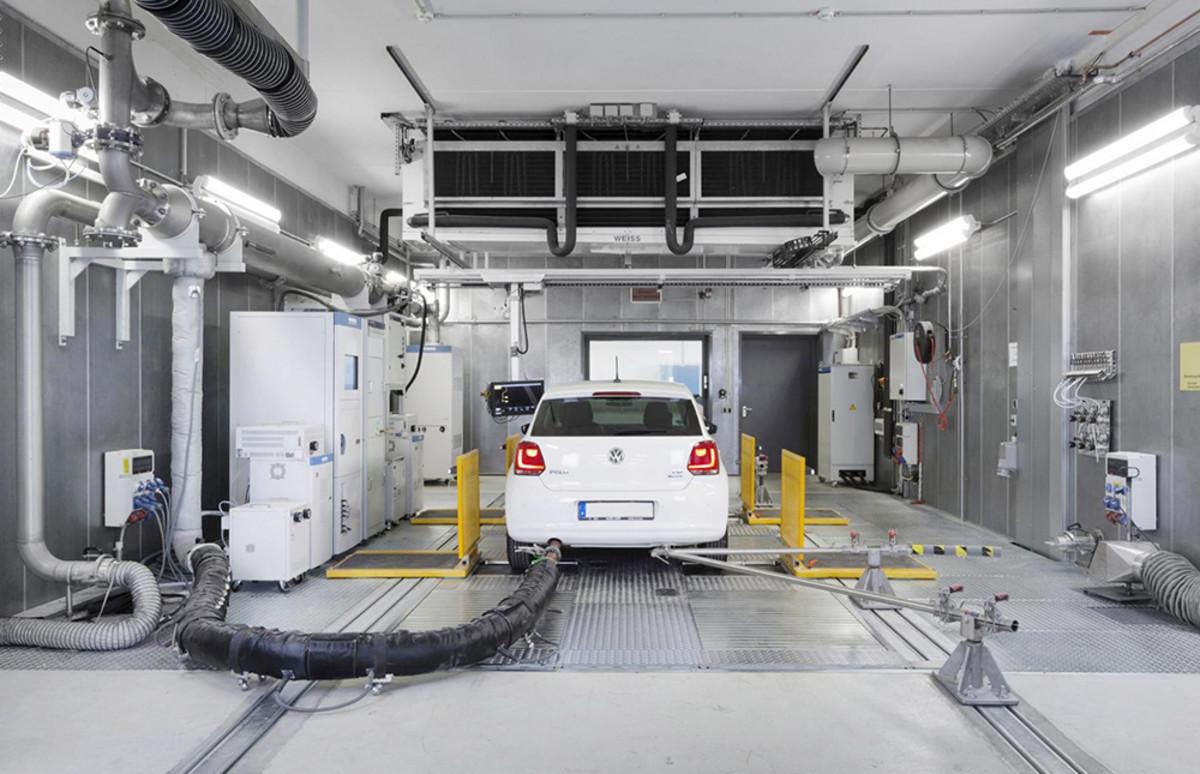Energy Management System (EMS)

Prediction and optimization of volatile energy usage at R&D sites
HORIBA contributes to reducing environmental impact, including the reduction of Greenhouse Gas (GHG) emissions throughout the product lifecycle and the entire supply chain, through advanced engineering and approaches.
Achieving a carbon-neutral society requires evaluating environmental impact not only during product use but also throughout manufacturing, reuse and disposal of products, as well as overall corporate activities, using Life Cycle Assessment (LCA) and the GHG Protocol. Disclosing these evaluations to stakeholders, clarifying priorities and target values, and reducing the company's own GHG emissions are essential. Additionally, addressing indirect GHG emissions related to corporate activities – beyond those directly emitted by the company – is crucial to minimizing the overall environmental impact on society.
Table of Contents
LCA (Life Cycle Assessment) is a method for evaluating the environmental impact of products and services throughout their lifecycle (resource extraction - raw material production - product manufacturing - distribution and consumption - disposal and recycling). LCA is defined by ISO 14040 and 14044. For example, the diagram on the right outlines the LCA for automobiles. Traditionally, the focus was only on CO2 emissions during driving. However, as required by LCA, it is now the responsibility of manufacturers to reduce environmental impact at all stages of the product lifecycle, from fuel extraction and material procurement to manufacturing, use, disposal, and recycling.
The GHG Protocol is a guideline published by the GHG Protocol Initiative. This protocol classifies the entire supply chain of customers into three scopes, called Scope 1, 2, and 3, and calculates the total GHG emissions for each scope, thereby determining the GHG emissions for the entire corporate activity (entire supply chain).
Scope 3 covers indirect emissions other than Scope 1 and 2 across the entire corporate activity and consists of 15 categories.
Using the GHG Protocol, it is important to track GHG emissions (activity data × emission factors) for Scope 1 and 2 emissions (emissions from the company's own operations) and Scope 3 emissions (indirect emissions from the value chain) across the 15 categories. By focusing on areas where significant reduction effects can be expected, companies should plan, implement, and evaluate GHG reduction strategies. (See the diagram below: Supply Chain Emissions and Scope 1, 2, and 3)
HORIBA offers various solutions to address the challenges of each scope and contribute to the reduction of GHG emissions.
To reduce GHG emissions, companies should first improve the productivity of their own factories in Scope 1 by reducing the materials and fuels used. In Scope 2, it is important to reduce the amount of electricity required for production and to promote the use of electricity from low-GHG emission sources (e.g., co-firing or dedicated firing of carbon-free hydrogen or ammonia). These measures will lead to a reduction in the company's own GHG emissions.
Improving the fuel efficiency of mobility supporting corporate activities and reducing the volume, weight, and size of transported goods will reduce the amount of gasoline, diesel, and electricity used, leading to reductions in GHG emissions in Scope 3 categories 4, 9, and 11. Additionally, reducing employee business trips and changing commuting patterns will contribute to reductions in GHG emissions in Scope 3 categories 6 and 7.
Reducing the generation of unnecessary materials and waste during manufacturing contributes to the reduction of materials, electricity, and manufacturing costs. HORIBA offers productivity improvement solutions for plants and factories in various industries. Here, we introduce solutions that contribute to productivity improvement in petrochemical plants and refineries.
In the production process, unused gases called off-gases are generated. Off-gases that cannot be utilized throughout the process are incinerated in flare stacks, leading to increased CO2 emissions. Improving productivity by reducing the amount of off-gas through high-sensitivity process gas measurement contributes to the reduction of both production raw materials and CO2 emissions.
HORIBA Solutions>>
High-Sensitivity, High-Speed, Real-Time Measurement of Low-Concentration Impurity Gases
By measuring low-concentration impurity gases (methane, ethane, acetylene, etc.) contained in high-concentration raw gases with high sensitivity, high speed, and in real-time, and feeding back to the production control system, the amount of off-gas generated can be reduced.
Process Laser Gas Analyzer PLGA-1000
To improve the power generation efficiency of thermal power plants, the scaling up and commercialization of IGCC (Integrated Gasification Combined Cycle) for coal-fired power plants is accelerating. Furthermore, various challenges are being addressed to establish technologies for IGFC (Integrated Gasification Fuel Cell Combined Cycle) based on IGCC and GTFC (Gas Turbine Fuel Cell Combined Cycle) for LNG-fired power plants. The introduction of high-efficiency turbines is also progressing. HORIBA provides a wide range of analytical instruments and measuring instruments, including devices that contribute to improving power generation efficiency and the operation and management of exhaust gas treatment systems, as well as continuous analyzers for pollutants that play an important role in reducing environmental impact, and instruments used in development experiments and demonstrations, contributing to solving the challenges of thermal power generation.
HORIBA Solutions >>
Increasing power generation through co-firing or dedicated firing using next-generation alternative fuels such as carbon-free hydrogen and ammonia contributes to the reduction of GHG emissions. Therefore, the development and demonstration of burners, combustors, and turbines using these fuels are accelerating. In co-firing or dedicated firing power generation using ammonia, technologies to suppress the generation of nitrous oxide (N2O), unburned ammonia (NH3), and nitrogen oxides (NOx), as well as improvements in co-firing rates, are progressing. On the other hand, in co-firing or dedicated firing power generation using hydrogen, the establishment of technologies for combustion stabilization, including backfire prevention, and NOx reduction, as well as improvements in power generation efficiency, including infrastructure, are important points. HORIBA offers a wide range of gas measurement solutions necessary for the utilization of alternative fuels, from alternative fuel production to combustion and exhaust gas treatment processes, environmental regulations, and GHG reduction.
HORIBA Solutions >>
Hydrogen Engine and Ammonia Combustion/Power Generation Gas Turbine Evaluation
GHGs include carbon dioxide (CO2), methane (CH4), nitrous oxide (N2O), and fluorocarbons. Continuous measurement of GHGs in exhaust gases is an effective means for investigating, planning, implementing, and evaluating GHG reductions. In particular, the reduction and management of N2O, which has 298 times the greenhouse effect of CO2, is required in various industries. For example, when reducing N2O using the latest equipment such as thermal decomposition gasification treatment, it is important not only to monitor the operating status of the equipment but also to verify and evaluate the effects of the introduction. Continuous measurement of N2O in exhaust gases greatly contributes to such verification and evaluation, as well as to improving the reduction rate.
HORIBA Solutions >>
Contributing to the Reduction of N2O Emissions
For portable continuous measurement: Portable Gas Analyzer PG-344CN
For continuous measurement at facilities: Stack Gas Analysis System ENDA-5000 Series
For measurement at laboratories: Multi-Component Gas Analyzer VA-5000 Series
In addition to improving the fuel efficiency of current vehicles, it is also necessary to accelerate the introduction of vehicles that adapt to diversified fuels (H2, biomass-derived synthetic fuels, electricity) to reduce GHG emissions. To accelerate the introduction, it is necessary to address challenges such as the development and demonstration of hydrogen engines and vehicles (FCEVs), evaluation of performance and corrosion when using synthetic fuels, and evaluation of EV performance and reduction of manufacturing costs. HORIBA contributes to the development of mobility with various measurement and evaluation solutions that flexibly respond to diversified fuels.
HORIBA Solutions >>
Measurement and Evaluation Solutions that Contribute to Improving Fuel Efficiency and Adapting Fuel Diversification in Mobility
For Improving the Fuel Efficiency of Current Vehicles
For the Development and Evaluation of Hydrogen Engines
For the Development and Evaluation of FCEVs
For the Development and Evaluation of EVs
Do you have any questions or requests? Use this form to contact our specialists.
